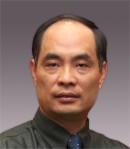|
Plenary
Lecture
Cooperated Output Regulation of Multi-Agent Systems:
Theory and Applications

Professor Jie Huang
Department of Mechanical and Automation
The Chinese University of Hong Kong
Shatin, Hong Kong
E-mail:
jhuang@mae.cuhk.edu.hk
Abstract:
Output regulation has been one of the central problems
in control theory and applications for a few decades.
This problem not only needs to guarantee the stability
of the closed-loop system, but also enable the output of
the closed-loop system to asymptotically track a class
of reference inputs and reject a class of disturbances.
Thus this problem is more challenging than the
stabilization problem. This problem can precisely
formulate many complex control problems such as the
vibration suppression of high speed trains, vertical
take-off and landing of airplanes in a carrier, and
robot control and manipulation, and is thus of practical
interests. So far the output regulation problem is
mainly studied via a centralized control approach. As
the world becomes more and more interconnected, more and
more practical control problems such as the coordination
of a group of mobile robots, and the formation of a
group of unmanned flight vehicles must be described by a
multi-agent system. Therefore, in this talk, we will
describe a framework for handling the output regulation
problem for a multi-agent system. The core of this
framework includes the establishment of the concepts of
the distributed observer, and the distributed internal
model. On one hand, we will show that this framework
will set a stage for solving the asymptotic tracking and
disturbance rejection problem in an uncertain
multi-agent system via a distributed control approach.
On the other hand, we will show that this framework
contains many control problems of multi-agent systems
such as consensus, synchronization, and formation as
special cases, thus leading to a unified solution to
several different control problems of multi-agent
systems.
Brief Biography of the Speaker:
Jie Huang studied Power Engineering at Fuzhou University
from 1977 to 1979 and Circuits and Systems at Nanjing
University of Science and Technology (NUST) from 1979 to
1982. He got his Master's degree from NUST in 1982 and
was a faculty member there from 1982 to 1986. He
completed his Ph.D. study in automatic control at the
Johns Hopkins University in 1990 and subsequently held a
post-doctoral fellow position there until July 1991.
From August 1991 to July 1995, he worked in industry in
USA. In September 1995, he joined the Department of
Mechanical and Automation Engineering, the Chinese
University of Hong Kong. He is now a professor and also
the director of Applied Control and Computing Laboratory
there. He served as a Science Advisor to the Leisure and
Cultural Services Department of Hong Kong Special
Administrative Region, and Honorary Advisor to Hong Kong
Science Museum. His research interests include control
theory and applications, robotics and automation, neural
networks and systems biology, and guidance and control
of flight vehicles. He authored two books and numerous
papers. He received China State Natural Science Award,
Class II, in 2010, Croucher Senior Research Fellowship
award in 2006, and the best paper award (with Zhiyong
Chen) of the Eighth International Conference on Control,
Automation, Robotics, and Vision in 2004. He is IFAC
Fellow and IEEE Fellow. Jie Huang is / was editor,
associate editor, guest editor of several journals. He
was Distinguished Lecturer of IEEE Control Systems
Society from 2005 to 2008, member of the Board of
Governors of IEEE Control Systems Society from 2006 to
2007. He served as general chair, program chair in
numerous international Conferences.
|
